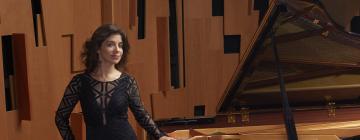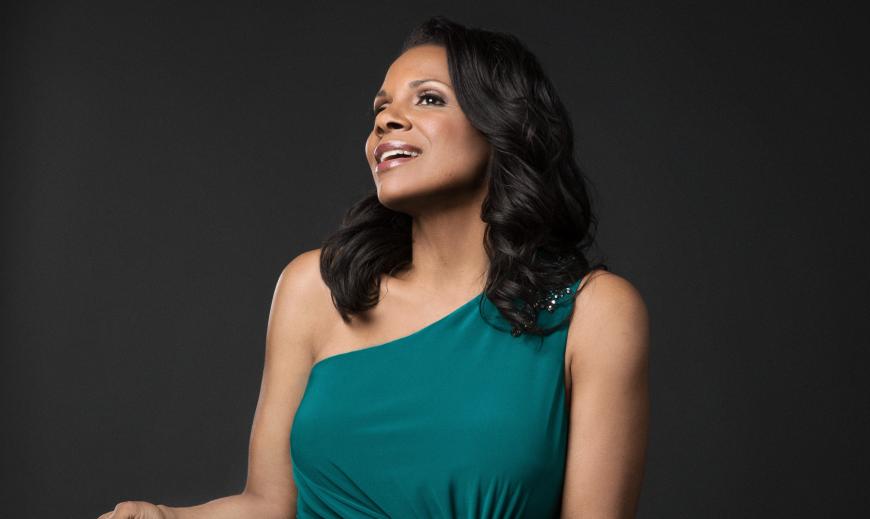
It is not at all surprising to read that Audra McDonald brought an audience to tears. But it is rather remarkable to learn she did so singing a song that was written for, and popularized by, an amphibian.
But according to a critic for the Toronto Star, that’s precisely what happened when the six-time Tony Award winner gave a concert in that Canadian city earlier this month. Glenn Sumi reported that the soprano’s “poignant lullaby version” of the wistful Muppet ballad “It’s Not Easy Being Green” had “everyone in the house dabbing their eyes.”
McDonald is used to that reaction. “It’s a much heavier song than people realize,” she said. “I think it catches them off guard.
“Kermit,” she added, tongue only partially in cheek, “is very deep.”
McDonald’s ability to find and convey the emotional core of a piece, combined with her remarkably rich singing voice, places her in the very top ranks of today’s musical theater performers. Californians will have three opportunities to appreciate her gifts live this week. She is performing in concert with the San Francisco Symphony at Davies Symphony Hall on Nov. 29, with her trio at UC Santa Barbara on Nov. 30, and at the Dorothy Chandler Pavilion on Dec. 2, presented by Los Angeles Opera.
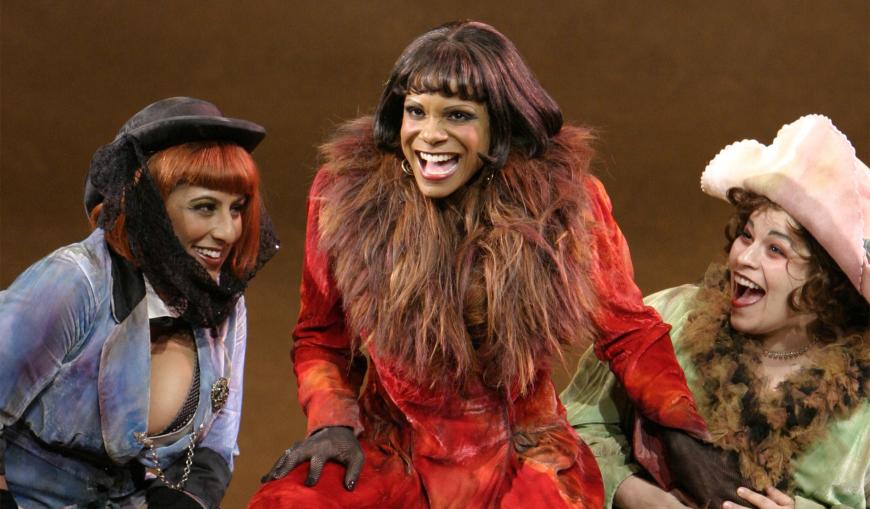
The list of McDonald’s artistic accomplishments is far too long to run in full, so some highlights will have to suffice. Six Tony Awards — more than any other performer. (She recently received her 10th nomination.) Two Grammys. One Emmy. She has excelled in a variety of media: theater (her Broadway appearances include Master Class, Ragtime, and A Raisin in the Sun), film (she’s in the cast of the current biopic Rustin, which examines the life of the 1960s civil rights crusader), and television (co-starring with Christine Baranski in The Good Fight, arguably the sharpest dramatization to date of the insanity of the Trump years).
McDonald grew up in Fresno, then moved to New York to study voice at The Juilliard School. Her California performances are infrequent but all the more anticipated for that reason. They’ve included LA Opera’s celebrated 2007 production of Bertolt Brecht and Kurt Weill’s Rise and Fall of the City of Mahagonny, which was subsequently televised on PBS.
On her current tour, she is singing music by American composers, ranging from the Great American Songbook to contemporary works. She talked about her approach to her art in a telephone interview with SF Classical Voice, which has been slightly edited for clarity and concision.
How do you put together your set list? Being a theater person, are you trying to create an arc of some sort?
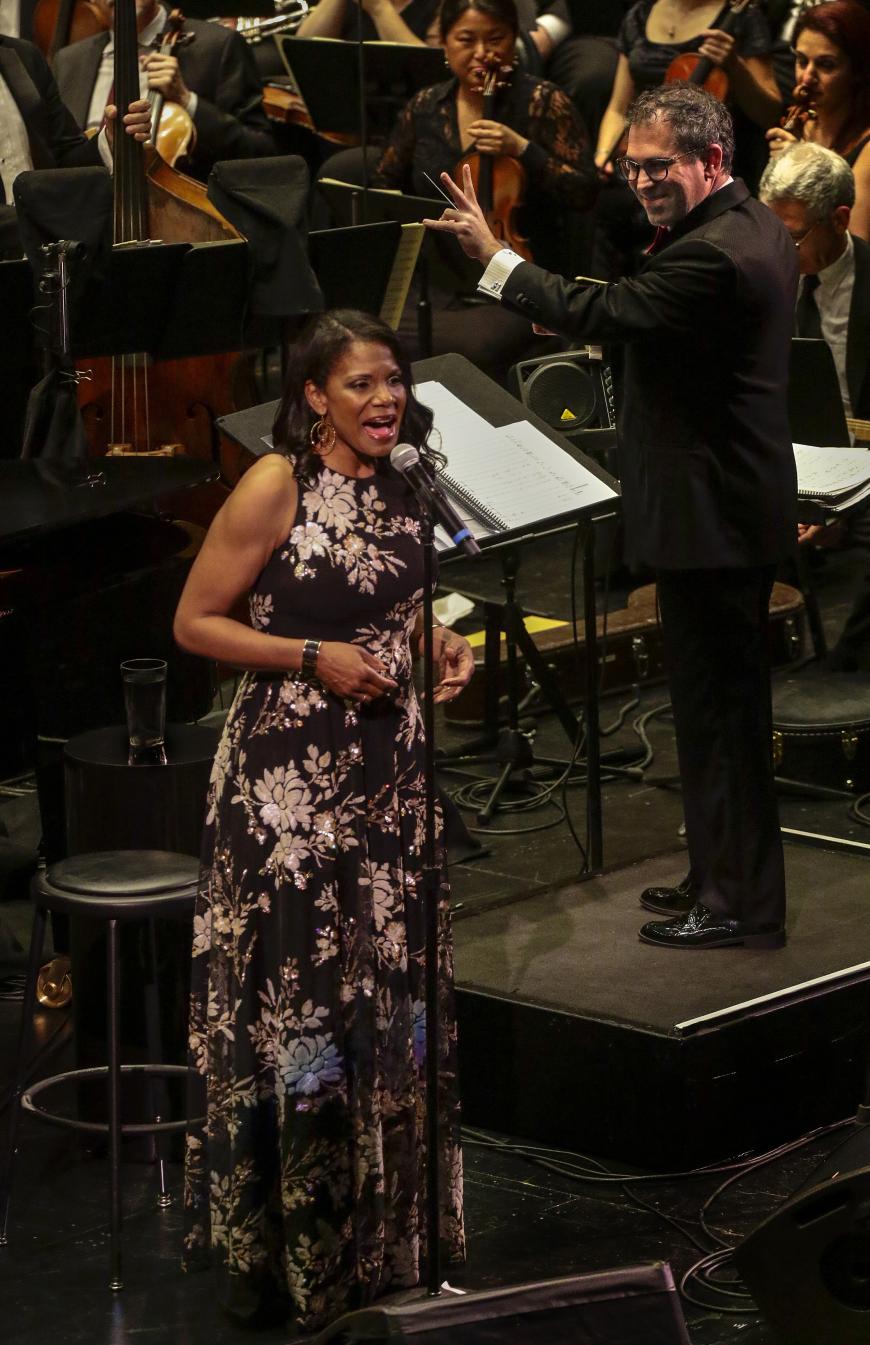
Absolutely. That’s really important. My musical director Andy Einhorn and I work very hard on our set lists. We think of a concert as a meal. You have your appetizers, then you go into the heavy stuff, followed by a nice dessert. Where we put songs in our concert is very deliberate.
To extend that metaphor, what sort of songs constitute the main course? More serious ones? Songs that hit a strong emotional chord?
That’s a good way of putting it. I want my evenings to feel like the audience is in my living room and we’re all getting to know each other. I find that when you are getting to know someone, you first chitchat about the weather before you bring up the subject of world peace or something horrible that happened to you. Your heart starts to open up a little bit. So the conversation becomes more emotional, more vulnerable, as it goes on.
You’re not going to talk about your childhood trauma as soon as you meet someone.
Right! But you might get there if you start to feel comfortable with that person and you start to trust that person. I let the audience know what I’m thinking and feeling, how I came to these songs, and talk about my life and career. Hopefully that allows an audience to be more open.
You’re performing with the SF Symphony, with your trio in Santa Barbara, and with the LA Opera Orchestra. Does your repertoire change depending on the configuration behind you? Does your style of delivery change at all?
The repertoire changes slightly. I don’t consciously change my delivery. You do have to make a transition depending on whether it’s a trio or a 60-piece orchestra, but I’ve been doing it long enough that I don’t really have to think about it. Sound checks are there for a reason. You send people out in the hall and make adjustments accordingly — sometimes during the course of a concert.
In an interview with The Guardian a couple of years ago, you used a phrase I had never come across before. You said that when singing a song, you focus on “living in the why.” What does that mean to you?
It’s interesting. As I was studying to play Billie Holiday in Lady Day at Emerson’s Bar and Grill, I found a couple of interviews where she talked about the same thing. She had to have a reason to sing a certain song. There were certain songs people would ask her to sing on a certain night that she wouldn’t do because she “wasn’t feeling it.”
[In much the same way,] there always has to be a “why” for me. You need to have a reason why you are singing a particular song at a particular minute. Take “It’s Not Easy Being Green.” I’m not going to go out and just say, “Here’s the Kermit the Frog song,” and just go. I tell the audience why I have chosen that particular song — what moved me enough about that song that I learned to sing it and am now presenting it to you.
Not everybody works this way, but I need that. It also gets me away from solely thinking about what my voice sounds like. It keeps me in the storytelling of each song.
Does that reflect your musical theater training?
Yes, but it’s also true in opera. The main focus there is on your sound, but even in opera, there should be a “why.” There’s a reason why Violetta is trilling so high at that moment.
Speaking of opera, the line between that art form and musical theater seems more and more porous these days. Broadway composer Jeanine Tesori has written operas. Your fellow Broadway star Kelli O’Hara has performed at the Metropolitan Opera. Can you see yourself following in her footsteps?
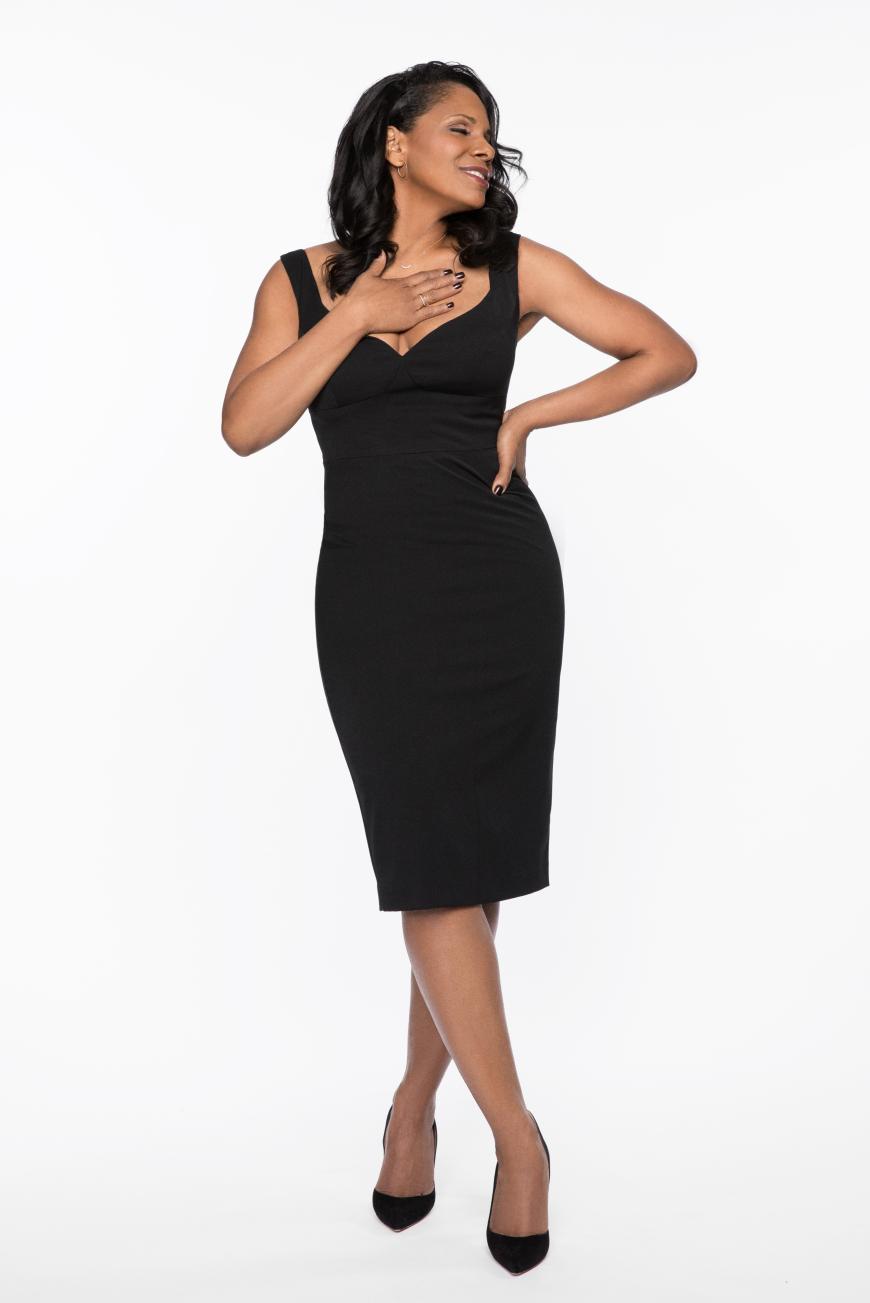
If the right opportunity presented itself, and it felt like the right thing for me to do artistically, yes. The few operas I have done have come along at the right time and presented the right kind of challenge. There was the right alchemy of the people involved and what the opera was about that attracted me. Opera isn’t something I’ve had a huge calling to do. I’ve never felt that “if I don’t sing Mimi, I’m going to die.” I do enjoy it as an audience member, though.
If there aren’t any operatic roles on your bucket list, are there any classic theatrical characters you very much want to portray?
There are, but I keep them close to my chest. We’ll see if they happen. There are some roles where I think, “Huh, don’t know whether I would succeed at that, but it’s a meaty challenge I’d like to try somewhere. Maybe a teeny-tiny theater somewhere.”
You were planning to play Blanche DuBois in a summer 2020 production of A Streetcar Named Desire, which certainly qualifies as a meaty challenge.
The pandemic put an end to that. I would love to have another stab at that. I very much enjoyed digging into her psychoses and her brilliance. We recorded [an audio version of the play] during the pandemic. I was literally in my bedroom closet.
You grew up in California — Fresno, to be precise. How did coming of age in California shape who you are?
People don’t think of Fresno as a bastion of culture, but there are a lot of performing arts there — and because it was a smaller city, there were a lot of opportunities. I went to a performing arts junior high and a performing arts high school. I was performing at a dinner theater from age 9 until I graduated from high school. I was on a kids’ cable-access television show that was on weekly for years. So I had a lot of performance opportunities. That absolutely shaped me.
By the time I moved to New York, I had spent eight years in the theater. That gave me a very solid foundation. I had already developed discipline: knowing how to behave backstage, making sure you came to rehearsal with your lines learned. I was also exposed to so much. My dinner theater did 12 productions per year, so I was exposed to all kinds of musical theater.
You told Vanity Fair you identify with Judy Garland, specifically because of the insecurity she felt as a performer even once she was famous and acclaimed. Today we call it “imposter syndrome” — the fear that people will find out you don’t know what you’re doing. How does that manifest for you? Do you get stage fright?
I still have massive stage fright. Forever and always. Now I have more tools to combat that, to help myself through those huge moments of insecurity that still plague me every single time I walk onto a stage. I remember reading when I was young that Barbra Streisand had stage fright, and I thought, “How can that be?” Now that I’m older, I absolutely understand it.
Do the nerves let up once you start singing?
It depends. It depends on what is still to come in a concert. It depends on the role I’m doing or if a performance starts to go south. You never know what’s going to happen in live theater.
Can you use that nervous energy to infuse a performance?
Yes — so long as it doesn’t overtake you.
You are a politically aware person. Many of your straight acting roles are in plays and films that address difficult issues such as racism. Do you feel pulled toward this kind of material?
It’s important for me to speak up for things I believe in and raise awareness of certain social justice issues. I want to add to the conversation.
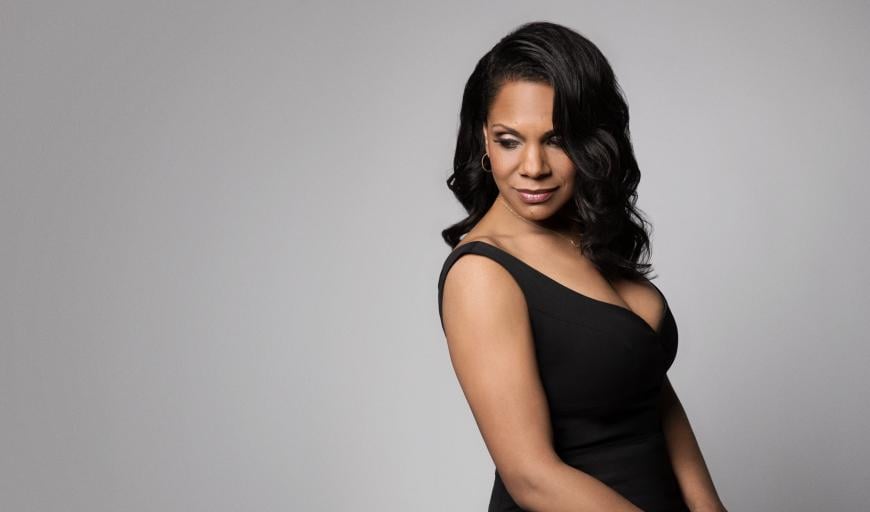
On another level, do you see a concert hall as a place where people who may be politically polarized can join together, at least temporarily, in a shared emotional experience?
Yes! I think about a Stevie Wonder concert I went to at Madison Square Garden four or five years ago. To the left of me was a group of white ladies in their 70s and 80s. To the right of me were Black children. Behind me was an Asian couple. There was every possible race, age, gender in that audience, all of whom probably had completely different political ideas and alliances. But we were all united under Stevie. We shared a part of our humanity.
That’s what I hope for. I hope for a shared communion, even if it’s just for a few hours.
